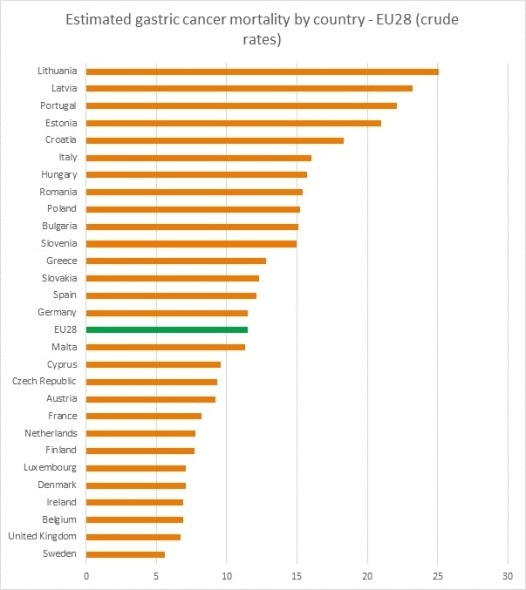
World Stomach Day: International initiative to raise awareness and support for a vital organ
Tuesday, 2 October 2018 marks the first ever World Stomach Day, an international initiative to raise awareness and support for one of our most vital organs.

A sophisticated organ with a unique physiology, biochemistry, immunology and microbiology, the stomach is an integrated part of the digestive system that acts as a reservoir for food, protects the body against foreign elements entering the bloodstream and protects against microbial colonization.
Whilst occupying a central role in the digestive tract, the stomach also presents a variety of challenges. Peptic ulcer disease, gastroenteritis, functional dyspepsia and gastric (stomach) cancer are all digestive diseases that originate in the stomach.
The physiology of our stomach is often disrupted by Helicobacter pylori (H. pylori) infection, which is the world’s most common chronic bacterial infection. First discovered in 1982, estimates suggest that more than 50% of the world’s population are infected with H. pylori. Whilst it has no or only mild harmful effects in most people, reports suggest the infection is a causal agent for more than 60% of gastric ulcers and approximately three quarters of gastrointestinal malignancies. Most people do not know that they are infected until they develop symptoms of gastric irritation, such as heartburn or dyspepsia. A diagnosis is usually made using a blood or breath test but can also be made through an endoscopy or a stool test. Throughout Europe, the prevalence of H. pylori is much higher in eastern and southern than in northern and western regions and there is a strong association between the infection and social deprivation.
Classified as a carcinogen by the International Agency for Research on Cancer, the H. pylori infection is the most significant factor leading to the development of gastric cancer. One of the most aggressive forms of digestive cancer with a poor prognosis, gastric cancer claims the lives of almost 60,000 EU citizens every year and the disease mainly affects older generations, with 80% of cases among people aged between 60 and 80 years old. In addition to longstanding H. pylori infection, other risk factors for gastric cancer include a family history of the disease, smoking and a diet high in salt.
According to research presented at UEG Week 2017, treating H. pylori infection can lead to a marked reduction in the risk of stomach cancer. The population-based study, which involved more than 63,000 people who had received antibiotic-based treatment for H. pylori infection, showed a 22% reduction in the risk of developing gastric cancer in those aged 60 years and over compared with the general population.
Another important challenge is the early diagnosis of gastric cancer and so-called pre-cancerous lesions, preceding the development of gastric cancer, whose correct clinical management and surveillance may reduce the cancer-related mortality. A lot of efforts are now employed to develop the best non-invasive approaches to detect and follow-up the patients with these lesions.
World Stomach Day marks the thirteenth anniversary of Barry Marshall and Robin Warren’s Nobel Prize in Physiology or Medicine award in 2005. Their discovery identified that inflammation of the stomach (gastritis) as well as ulceration of the stomach (peptic ulcer disease) is the result of an infection caused by H. pylori. Their remarkable discoveries have largely impacted how we manage gastric diseases today.
Source:


































No hay comentarios:
Publicar un comentario